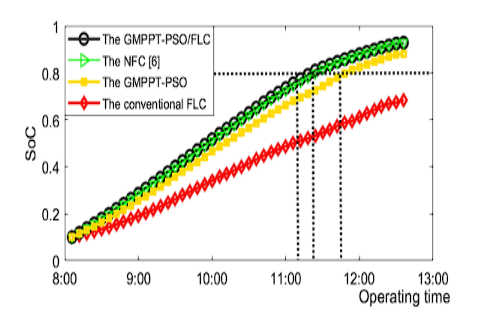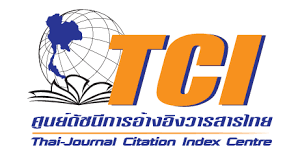GMPPT-based PSO-FLC for Solar PV Charging System
doi: 10.14456/mijet.2023.10
Keywords:
solar charging system, particle swarm optimization, global maximum power point tracking, fuzzy logic controllerAbstract
Solar-powered charging systems have gained increasing attention in various applications. However, ineffective charge regulation can degrade their performance, particularly under partial shading conditions (PSC). To address this problem, a global maximum power point tracking based on particle swarm optimization (GMPPT-PSO) jointly operated with an MPPT-based fuzzy logic controller is proposed. To achieve an optimal charge controller, the main parameters of the GMPPT-PSO are adaptively changed to catch the dynamic PSCs, and all fuzzy parameters are derived and optimized through another PSO to reduce complexity. As a result, the control fuzzy rules have significantly reduced by about 20%. When applied to the battery through constant current-voltage charge, the proposed controller provides a fast transient and reduces the steady-state oscillations that shorten the battery life more efficiently than the conventional controllers. In addition, energy utilization and charging efficiencies, power loss improvement, and charge time reduction are improved by up to 17%, 8%, 20%, and 20%, respectively, over the rest.
References
I. Abadi, D. N. Fitriyahah, and A. U. Umam, “Design of maximum power point tracking (MPPT) on two axes solar tracker based on particle swarm fuzzy,” AIP Conference Proceedings, vol. 2088, no. 1, pp. 1-11, 2019.
N. Tawanna, F. Takkabutr, A. Kesutha, R. Wongsthan, A. Nuangnit, and N. Wongsinlapamorakot, “Improvement performances of PV water pumping system using MPPT-based modified P&O controller: Modeling, setting experimental package and analysis,” The Journal of KMUTNB, vol. 31, no. 1, pp. 5-15, 2021.
F. A. Mohammed, M. E. Bahgat, S. S. Elmasry, and S. M. Sharaf, “Design of a maximum power point tracking-based PID controller for DC converter of stand-alone PV system,” Journal of Electrical Systems and Information Technology, vol. 9, pp. 1-15, 2022.
T. Shanthi, “Neural network based MPPT controller for solar PV connected induction motor,” International Journal of Robotics and Automation (IJRA), vol. 7, no. 2, pp. 129-139, 2018.
L. K. Narwat and J. Dhillon, “Design and operation of fuzzy logic based MPPT controller under uncertain condition,” Journal of Physics: Conference Series, vol. 1854, pp. 1-13, 2021.
R. Wongsathan and A. Nuangnit, “Optimal hybrid neuro-fuzzy based controller using MOGA for photo-voltaic (PV) battery charging system,” International Journal of Control, Automation and Systems, vol. 16, no. 6, pp. 3036-46, 2018.
M. Kamran, M. Mudassar, M. R. Fazal, M. U. Asghar, M. Bilal, and R. Asghar, “Implementation of improved Perturb & Observe MPPT technique with confined search space for standalone photovoltaic system,” Journal of King Saud University – Engineering Sciences, vol. 32, no. 7, pp. 432-441, 2020.
Y. Shaiek, M. Ben Smida, A. Sakly, M. F. Mimouni, “Comparison between conventional methods and GA approach for maximum power point tracking of shaded solar PV generators,” Solar Energy, vol. 90, pp. 107-122, 2013.
A. Badis, M. N. Mansouri, and A. Sakly, “PSO and GA-based maximum power point tracking for partially shaded photovoltaic systems,” 2016 7th International Renewable Energy Congress (IREC), March 22-24, 2016, Hammamet, Tunisia, pp. 1-6, 2016.
P. S. Gavhane, S Krishnamurthy, R. Dixit, J. P. Ram, and N. Rajasekar, “EL-PSO based MPPT for solar PV under partial shaded condition,” Energy Procedia, vol. 117, pp. 1047-1053, 2017.
C. H. Hussaian Basha and C. Rani, “Performance analysis of MPPT techniques for dynamic irradiation condition of solar PV,” International Journal of Fuzzy System, vol. 22, no. 5, pp. 1-23, 2020.
A. Wiesner, R. Diez, and G. Perilla, Design and implementation of a Buck converter with MPPT for battery charge from solar module, 2013 Workshop on Power Electronics and Power Quality Applications (PEPQA), Bogota, Colombia, July 6-7, pp. 1-6, 2013.
J. Kennedy and R. Eberhart, Particle swarm optimization, Proceedings of ICNN’95 - International Conference on Neural Networks, Perth, WA, Australia, Nov. 27, 1995 – Dec. 1, pp. 1942-1948 vol.4, 1995.

Downloads
Published
How to Cite
Issue
Section
License

This work is licensed under a Creative Commons Attribution-NonCommercial-NoDerivatives 4.0 International License.








